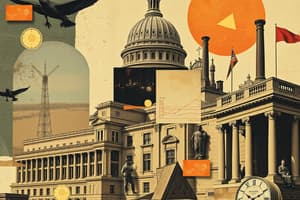Podcast
Questions and Answers
What is the primary function of the Financial System in an economy?
What is the primary function of the Financial System in an economy?
Which of the following correctly describes financial instruments?
Which of the following correctly describes financial instruments?
Who are considered surplus agents in the Financial System?
Who are considered surplus agents in the Financial System?
What role do financial intermediaries play in the Financial System?
What role do financial intermediaries play in the Financial System?
Signup and view all the answers
What is the importance of regulatory and supervisory authorities in the Financial System?
What is the importance of regulatory and supervisory authorities in the Financial System?
Signup and view all the answers
What was the principal activity of bankers during the Middle Ages?
What was the principal activity of bankers during the Middle Ages?
Signup and view all the answers
What does fiat money represent in a credit-based economy?
What does fiat money represent in a credit-based economy?
Signup and view all the answers
What is a primary feature of a financial economy?
What is a primary feature of a financial economy?
Signup and view all the answers
What factor is notably increased when transitioning to a financial economy?
What factor is notably increased when transitioning to a financial economy?
Signup and view all the answers
How are securities categorized in the context of direct finance?
How are securities categorized in the context of direct finance?
Signup and view all the answers
What is required for borrowers and lenders to efficiently meet in a financial system?
What is required for borrowers and lenders to efficiently meet in a financial system?
Signup and view all the answers
What increases for small investors in the absence of good governance rules?
What increases for small investors in the absence of good governance rules?
Signup and view all the answers
What is the total global GDP projected to be in 2023?
What is the total global GDP projected to be in 2023?
Signup and view all the answers
What is one problem associated with a natural economy?
What is one problem associated with a natural economy?
Signup and view all the answers
Which of the following is NOT a function of money in a money-based economy?
Which of the following is NOT a function of money in a money-based economy?
Signup and view all the answers
What characterizes a credit-based economy?
What characterizes a credit-based economy?
Signup and view all the answers
Which of the following is a consequence of high search costs in a natural economy?
Which of the following is a consequence of high search costs in a natural economy?
Signup and view all the answers
What best describes a money-based economy compared to a natural economy?
What best describes a money-based economy compared to a natural economy?
Signup and view all the answers
Which sector is responsible for overseeing the functioning of the financial system?
Which sector is responsible for overseeing the functioning of the financial system?
Signup and view all the answers
What role does central banks play in a financial system?
What role does central banks play in a financial system?
Signup and view all the answers
What is a primary issue with using goods for trade in a natural economy?
What is a primary issue with using goods for trade in a natural economy?
Signup and view all the answers
Study Notes
The Financial System
- Consists of markets, institutions, and instruments to transfer funds from lenders to borrowers.
- The structure for financial activity in a modern economy, including production, supply, and exchange of financial services and products.
- Essential economic function is channeling funds from surplus agents (households, corporations, governments) to deficit agents.
Financial Markets
- Specialized markets for trading financial instruments.
- Critical for connecting borrowers and lenders.
- Promote economic efficiency.
Financial Instruments
- Contracts concerning financial rights and benefits.
- Assets for buyers, liabilities for sellers.
Financial Intermediaries
- Companies carrying out financial activities.
- Produce and negotiate financial instruments.
- Offer services related to instrument circulation.
Regulatory and Supervisory Authorities
- Organize and supervise financial markets.
- Establish rules and controls for market functioning.
Banking Sector
- Part of the financial system connected to the financial markets.
The Evolution of Economies
-
Natural Economy: Goods exchanged directly through bartering.
- Problems: double coincidence of wants, high search costs, indivisibility of goods, storage costs, arbitrary valuation.
- Money-Based Economy: Identification of a commodity as a unit of account, medium of exchange, and store of value (e.g., shells, metals, ceramic artifacts).
-
Credit-Based Economy: One agent provides money to another with a promise to repay.
- Initial forms in the Middle Ages with currency/accounting records on tables.
- Bankers primarily lending money.
- Money has no intrinsic value but is accepted as a medium of exchange.
-
Financial Economy: Financial assets serve as currency.
- Risk increases significantly.
Flows of Funds
-
Direct Finance: Borrowers borrow directly from lenders in financial markets.
- Borrowers sell securities (claims on future income or assets).
- Requires lenders to bear costs (research, monitoring)
- Requires good governance rules, low liquidity and small number of listed companies for small investors protection, which affects risks for small investors.
-
Indirect Finance: Financial intermediaries transfer funds.
- Purchase direct claims and transform them.
- Lenders invest small amounts of savings.
- Intermediaries perform asset transformation in several ways, including denomination-divisibility, maturity flexibility, diversification, and liquidity.
- Two Channels for Funds Flowing through the Financial System: Direct and Indirect finance.
Global GDP
- 2023 Global GDP: 105 trillion USD
- 2019 Global GDP: 87.8 trillion USD
- 2009 Global GDP: 14.45 trillion USD
- The U.S. accounts for 25.62% of the global economy.
- Global wealth is 454 trillion USD.
Studying That Suits You
Use AI to generate personalized quizzes and flashcards to suit your learning preferences.
Related Documents
Description
This quiz covers the fundamental concepts of the financial system, including markets, instruments, and intermediaries. It explores how funds are transferred from lenders to borrowers and the role of regulatory authorities. Test your knowledge on the structure and functions of this essential economic framework.




